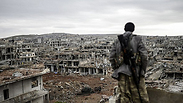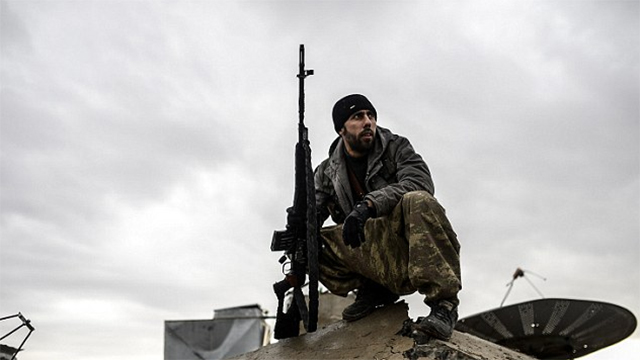
Kurds say Islamic State used chlorine as weapon in Iraq
Kurdish government says it has evidence organization used illegal chemical weapons against peshmerga forces.
The Kurdish region's Security Council said in a statement to Reuters that the peshmerga had taken soil and clothing samples after an Islamic State suicide bombing in northern Iraq in January. It said laboratory analysis showed "the samples contained levels of chlorine that suggested the substance was used in weaponized form."
Chlorine is a choking agent whose use as a chemical weapon dates back to World War One. It is banned under the 1997 Chemical Weapons Convention.
It was not possible to independently verify the Kurdish allegation.
The statement said the analysis was carried out in a European Union-certified laboratory after the soil and samples were sent by the Kurdish Regional Government to a "partner nation" in the US-led coalition that is fighting Islamic State militants in Iraq and Syria. A source in the Kurdish Security Council declined to identify the laboratory.
"The fact ISIS relies on such tactics demonstrates it has lost the initiative and is resorting to desperate measures," the Kurdish government said in the statement, using an alternate acronym for the Sunni militant group.
The Jan. 23 suicide car bombing took place on a highway between Mosul and the Syrian border where peshmerga forces were preparing defensive positions after a two-day offensive, the statement said.
A Kurdish security source said that the peshmerga fired a rocket at the car carrying the bomb so there were no casualties from the incident except for the suicide bomber.
About a dozen peshmerga fighters experienced symptoms of nausea, vomiting, dizziness or weakness, the source said.
The statement said the analysis was carried out in a European Union-certified laboratory after the soil and samples were sent by the Kurdish Regional Government to a "partner nation" in the U.S.-led coalition that is fighting Islamic State militants in Iraq and Syria.
The source described the samples as "leftovers from the suicide bomber", but declined to identify the laboratory.
Iraq's Kurds were the victims of the deadliest chemical attack of modern times when Saddam Hussein's air force bombed the town of Halabja in 1988, gassing at least 5,000 people to death.
Weapons expert killed
The US Central Command said on Jan. 30 that an Islamic State chemical weapons expert had been killed in a coalition air strike six days earlier near Mosul - the day after the car bombing cited in Saturday's statement.
The expert, Abu Malik, had been a chemical weapons engineer during the rule of Saddam Hussein and then affiliated himself with al-Qaeda in Iraq in 2005, Central Command said at the time. When he joined Islamic State, it gave the insurgent force a chemical weapons capability, it added.
The Pentagon in Washington had no comment on Saturday's Kurdish statement.
Malcolm Dando, professor of international security at the University of Bradford, and an expert on biological and chemical warfare, said chlorine was an easy gas to obtain. "It's extensively used, you only need to google industrial uses of chlorine, it's extensively used industrially," he told Reuters.
Western diplomats in The Hague, where the OPCW is based, have long feared IS fighters would get their hands on chemical weapons. It is not easy to make such weapons and IS tried to recruit experts when it took over Mosul last year, diplomatic sources told Reuters. They were not believed to have been successful.
Kurdish forces, backed by US-led air strikes, have taken a prominent role in fighting the Islamic State jihadists who last year declared a cross-border caliphate after seizing land in eastern Syria and northern Iraq.
No international organisation has documented the use of chemical weapons on Iraqi territory in the war with IS.
The Kurdish authorities said in their statement they had "long suspected that (IS) fighters have been using chemical agents" and cited video footage from recent battles around the city of Tikrit between the militants and Iraqi troops and allied Shi'ite militias where "plumes of orange smoke" were visible.
Reuters was also e-mailed video footage and photos of what the Kurdish Security Council identified as images from the Jan. 23 attack. Among the photos were several of canisters lying on the ground that the council says were found at the site and contained chlorine.
In the Syrian civil war, a chlorine gas attack on the outskirts of Damascus in 2013 killed hundreds and nearly drove the US to launch airstrikes against the government of embattled President Bashar Assad. The US and Western allies accused Assad's government of being responsible for that attack, while Damascus blamed rebels.
There have been several allegations that the Islamic State group has used chlorine as well. In October, Iraqi officials claimed Islamic State militants may have used chlorine-filled cylinders during clashes in late September in the towns of Balad and Duluiya. Their disclosures came as reports from the Syrian border town of Kobani indicated that the extremist group added chlorine to an arsenal that already includes heavy weapons and tanks looted from captured military bases.
Insurgents have used chlorine gas in Iraq before. In May 2007, suicide bombers driving chlorine tankers struck three cities in Anbar province, killing two police officers and forcing about 350 Iraqi civilians and six US troops to seek treatment for gas exposure. Those bombers belonged to al-Qaeda in Iraq, which later became the Islamic State group.











